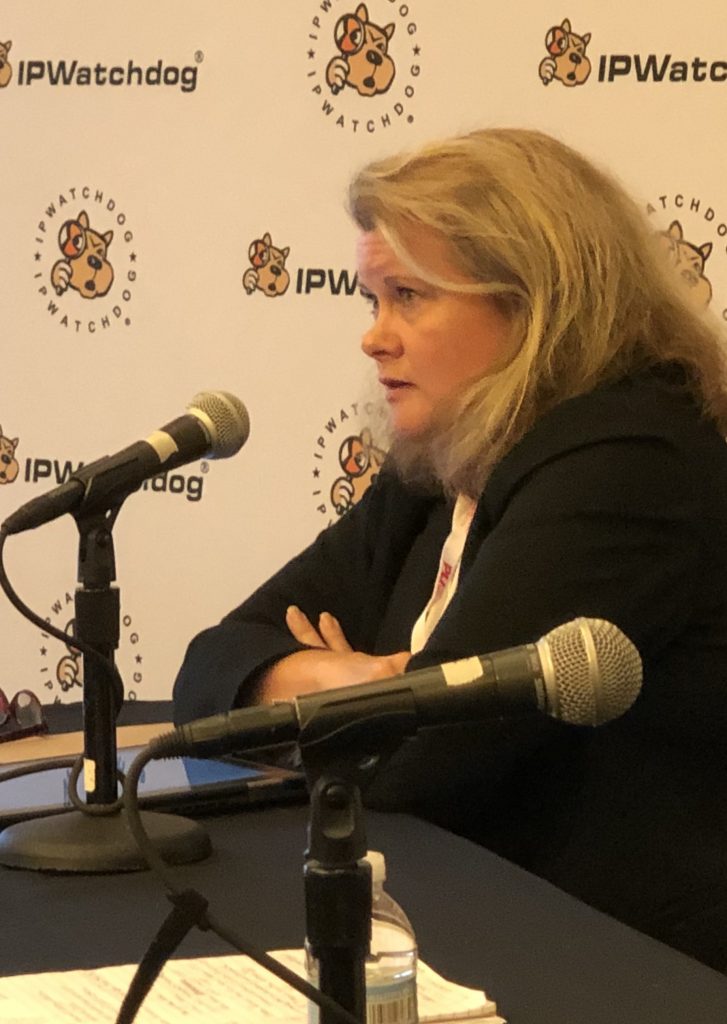“SSOs have two primary constituencies [contributors and implementers]. Good standard setting organization policy, and in fact, good innovation policy in general, would ensure a balance of these two divergent interests. However, IEEE’s amended IPR policy is wholly favorable to implementers.”

Professor Kristen Osenga
Speaking at IPWatchdog’s Patent Master’s Symposium today, Professor Kristen Osenga of The University of Richmond School of Law gave attendees a glimpse of her upcoming paper examining problems with the Institute of Electrical and Electronics Engineers – Standards Association’s (IEEE-SA) 2015 amendment to its intellectual property rights (IPR) policy. In reference to the title of the panel on which she was speaking, “Balance, Transparency & Reasonableness: Converging Approaches to SEP Licenses and FRAND Royalties,” Osenga explained that “balance transparency, and reasonableness simply were not part of the process” by which IEEE adopted the new policy.
Osenga’s paper, which is due to be published on the Social Science Research Network (SSRN) by the end of 2019, will examine the actions leading up to the adoption of the 2015 amended policy, as well as the aftermath. Below is an abstract of the paper; many of the issues it will touch upon were also covered in Osenga’s 2018 paper, “Ignorance Over Innovation: Why Misunderstanding Standard Setting Organizations Will Hinder Technological Progress.”
Abstract: “IEEE IPR Policy Amendments: Strategic Behavior and Feedback Loops”
In 2015, the Institute of Electrical and Electronics Engineers – Standards Association (IEEE-SA), one of the largest and most influential standard setting organizations, amended its intellectual property rights (IPR) policy. The amended policy has the effect of generally weakening patent rights for innovative companies that contribute technology to standard setting organizations (SSOs).
This seems like a rather counterproductive move for IEEE. People like technology; they like new stuff that technology makes possible. Our lives are made more fun, more productive, and often easier because of the technology we have available. And given the ubiquity of standardized technology in many of these technology areas, it would follow that we should also like SSOs.
SSOs have two primary constituencies. Contributors are innovative companies that submit new technology for consideration for incorporation into a standard. Implementers are companies that manufacture and offer standards-compliant goods and services to consumers. Both are necessary to get this standardized technology into the hands of the people, but unfortunately, their interests are greatly divergent. Contributors need to be incentivized to participate because these companies are making investments in research & development at a period of extreme uncertainty—that is, there is no guarantee the technology a contributor develops and contributes to the SSO will be incorporated into the standard. While there are non-monetary advantages to participating in an SSO as a contributor, one important incentive for contributors is the ability to obtain licensing income for the technology that is selected for incorporation. Implementers, on the flip side, want fair access to the technology incorporated in the standard and would prefer to pay as little as possible for that technology to maximize their profits. Good SSO policy, and in fact, good innovation policy in general, would ensure a balance of these two divergent interests. However, IEEE’s amended IPR policy does not balance these interests. Rather, the new policy is wholly favorable to implementers by weakening the patent rights of contributors. This article examines how this could happen and the aftermath of the adoption of this one-sided policy.
First, this article looks at the actions that led up to the adoption of the amended IPR policy, including the strategic behaviors and suspect bases that allowed a very one-sided policy to be adopted by the IEEE. Specifically, the way in which the ad hoc committee was formed to consider amending the IPR policy and the way in which this ad hoc committee behaved were not consistent with usual behavior at the IEEE-SA. Additionally, the underlying reasons given for considering, and adopting, the new IPR policy—that is patent holdup and royalty stacking—are theoretical problems at best and have not been shown to negatively impact any IEEE technology standard (or maybe any standard at all).
Second, this article considers the aftermath of the IEEE policy, focusing specifically on what I call “feedback loops.” These feedback loops are instances of others using the adoption of the amended IPR policy to further their arguments that these pro-implementer policies need to be adopted and expanded in various forums. Other scholars are looking into the impact of the amended IPR policy on contributors and technology standards. There have been significant impacts on the letters of assurance submitted to IEEE standards groups and some standards groups are reporting delay. The feedback loops I study, however, show that the effect of the IEEE’s amended IPR policy are far greater. Commentators and others are using the amended IPR policy to urge foreign competition authorities, as well as domestic and foreign courts, to similarly favor implementers over contributors. Scholars have used the amended IPR policy not just to argue for more policies that favor implementers, but have even argued that the fact the IEEE amended its policy proves the problems of patent holdup and royalty stacking are real, not hypothetical issues. Given these feedback loops, the effects of the IEEE’s amended IPR policy have the potential to be far more devastating and widespread than anticipated.

![[IPWatchdog Logo]](https://ipwatchdog.com/wp-content/themes/IPWatchdog%20-%202023/assets/images/temp/logo-small@2x.png)

![[[Advertisement]]](https://ipwatchdog.com/wp-content/uploads/2024/04/Patent-Litigation-Masters-2024-banner-early-bird-ends-Apr-21-last-chance-938x313-1.jpeg)

![[Advertisement]](https://ipwatchdog.com/wp-content/uploads/2024/04/Patent-Litigation-Masters-2024-sidebar-early-bird-ends-Apr-21-last-chance-700x500-1.jpg)

![[Advertisement]](https://ipwatchdog.com/wp-content/uploads/2021/12/WEBINAR-336-x-280-px.png)
![[Advertisement]](https://ipwatchdog.com/wp-content/uploads/2021/12/2021-Patent-Practice-on-Demand-recorded-Feb-2021-336-x-280.jpg)
![[Advertisement]](https://ipwatchdog.com/wp-content/uploads/2021/12/Ad-4-The-Invent-Patent-System™.png)







Join the Discussion
No comments yet.